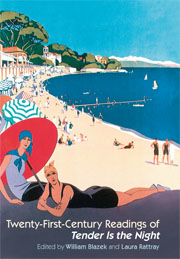Book contents
- Frontmatter
- Contents
- Acknowledgements
- List of Illustrations
- Introduction
- 1 ‘Can't We Put it in Writing?’: Some Short Precursors to Tender Is the Night
- 2 Tender Is the Night, ‘Jazzmania’, and the Ellingson Matricide
- 3 Sanatorium Society: The ‘Good’ Place in Tender Is the Night
- 4 ‘Some Fault in the Plan’: Fitzgerald's Critique of Psychiatry in Tender Is the Night
- 5 An ‘Unblinding of Eyes’: The Narrative Vision of Tender Is the Night
- 6 Si le soleil ne revenait pas: Swiss Clockwork Gone Mad in Tender Is the Night
- 7 ‘A Unity Less Conventional But Not Less Serviceable’: A Narratological History of Tender Is the Night
- 8 American Riviera: Style and Expatriation in Tender Is the Night
- 9 ‘Out Upon the Mongolian Plain’: Fitzgerald's Racial and Ethnic Cross-Identifying in Tender Is the Night
- 10 Gender Anxiety: The Unresolved Dialectic of Fitzgerald's Writing
- 11 Tender Is the Night and the Calculus of Modern War
- 12 Reading Fitzgerald Reading Keats
- Notes on Contributors
- Index
3 - Sanatorium Society: The ‘Good’ Place in Tender Is the Night
- Frontmatter
- Contents
- Acknowledgements
- List of Illustrations
- Introduction
- 1 ‘Can't We Put it in Writing?’: Some Short Precursors to Tender Is the Night
- 2 Tender Is the Night, ‘Jazzmania’, and the Ellingson Matricide
- 3 Sanatorium Society: The ‘Good’ Place in Tender Is the Night
- 4 ‘Some Fault in the Plan’: Fitzgerald's Critique of Psychiatry in Tender Is the Night
- 5 An ‘Unblinding of Eyes’: The Narrative Vision of Tender Is the Night
- 6 Si le soleil ne revenait pas: Swiss Clockwork Gone Mad in Tender Is the Night
- 7 ‘A Unity Less Conventional But Not Less Serviceable’: A Narratological History of Tender Is the Night
- 8 American Riviera: Style and Expatriation in Tender Is the Night
- 9 ‘Out Upon the Mongolian Plain’: Fitzgerald's Racial and Ethnic Cross-Identifying in Tender Is the Night
- 10 Gender Anxiety: The Unresolved Dialectic of Fitzgerald's Writing
- 11 Tender Is the Night and the Calculus of Modern War
- 12 Reading Fitzgerald Reading Keats
- Notes on Contributors
- Index
Summary
The ‘Swiss cure’ has long been associated with the promise of both physical and mental health. For centuries, in fact, Switzerland's political neutrality and its pristine geography have offered the order and stability, the peace and tranquillity, that nurture well-being, and the Alpine nation has cultivated and maintained this image. Especially since the late nineteenth century, when the vogue for nervous disorder, as opposed to madness or insanity, led to the development of the clinic as a replacement for the asylum, people such as the infirm, the ageing, and the mentally ill have traditionally sought treatment for their conditions within the sanatoria that nestle in the embrace of the towering Alps and perch on the shores of the country's glacial lakes. Indeed, Switzerland has functioned for the world as a ‘clean, well-lighted place’, to use Ernest Hemingway's phrase, a ‘good’ place beyond the reach of the moral corruption and debilitating chaos of modern life. It certainly seems to function as such in F. Scott Fitzgerald's Tender Is the Night.
Within a Swiss sanatorium, Dick Diver, deemed by his local military board to be ‘too much of a capital investment to be shot off in a gun’ (Tender 115), escapes the carnage of World War I to complete his degree and publish his first monograph, and a damaged Nicole Warren, victim of her father's incestuous possession, comes to be made whole again.
- Type
- Chapter
- Information
- Twenty-First Century Readings of 'Tender is the Night' , pp. 50 - 66Publisher: Liverpool University PressPrint publication year: 2007
- 2
- Cited by



